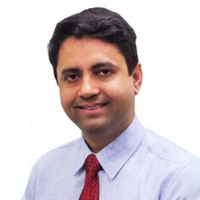CNLM FELLOW
Munjal Acharya, Ph.D.
Munjal Acharya, Ph.D.
Associate Professor
Department of Anatomy and Neurobiology
School of Medicine
University of California, Irvine
Office: B149 Med Sci B
Lab: B120 Med Sci B
Phone: (949) 824-9183
ZOT Code: 1275
Dr. Munjal Acharya's research is focused on the neurobiological mechanism(s) and mechanism-based mitigation strategies to alleviate cancer-related cognitive impairments (CRCI). Dr. Acharya has uncovered a glia-dependent pathophysiological mechanism of radiation-induced cognitive dysfunction. In addition, Dr. Acharya has developed human stem cell-based regenerative strategies to remediate the brain from the unintended side effects of cranial irradiation and chemotherapy. His research has delineated the paracrine mechanism (exosomes) of stem cell transplantation-mediated recovery of the injured brain. His recent work on BDNF augmentation to reverse chemobrain is poised to advance to clinical translation.
Dr. Acharya's Ph.D. was focused on sub-cellular membrane dysfunction in the epileptic brain (M. S. University of Baroda, India). His interest in neuroscience continued as a postdoctoral scholar at Duke University Medical Center (NC) to study the efficacy of stem cell grafting to treat epilepsy. Dr. Acharya joined the University of California Irvine as a CIRM postdoctoral fellow. Currently, Dr. Acharya is an Associate Professor at the Department of Anatomy & Neurobiology, with a joint appointment in the Department of Radiation Oncology. Dr. Acharya is a recipient of a Chancellor's Award for Undergraduate Teaching and the School of Medicine Equity and Diversity Award for Mentoring. As an Equity Advisor (School of Medicine), Dr. Acharya promotes inclusive excellence in education, research, and service and in hiring a diverse pool of faculty and staff that strengthens our public institution and brightens the goal of Discover, Teach, Heal.
Dr. Acharya's research is funded by the NIH, California Institute of Regenerative Medicine (CIRM), the American Brain Tumor Association (ABTA), the American Cancer Society, and the US Department of Defense.
Key Research Areas:
Neuroinflammation, Regenerative Medicine, Neuro-Oncology, Neurodegeneration, Epilepsy, Stem cells

 Browse Fellows
Browse Fellows